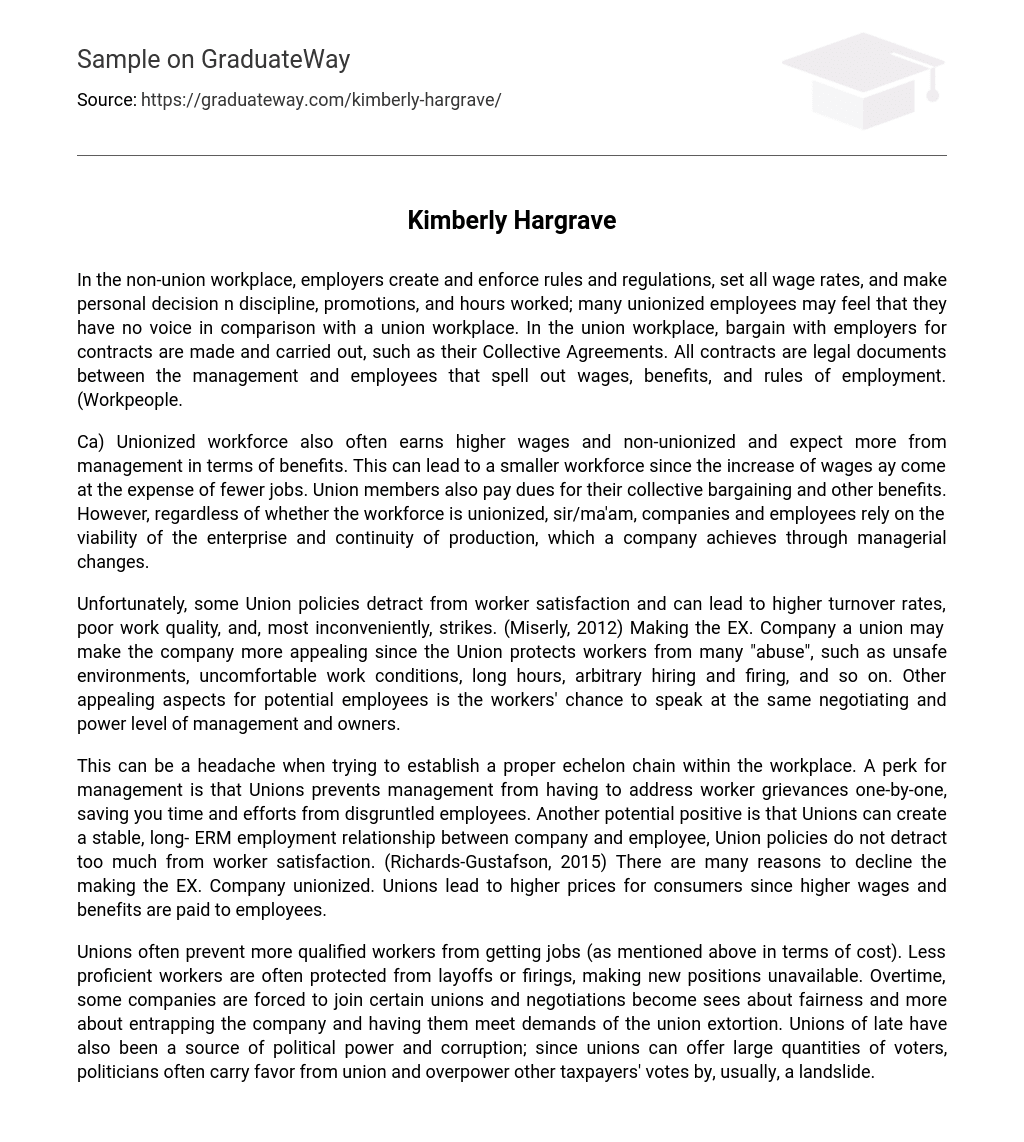In the non-union workplace, employers create and enforce rules and regulations, set all wage rates, and make personal decision n discipline, promotions, and hours worked; many unionized employees may feel that they have no voice in comparison with a union workplace. In the union workplace, bargain with employers for contracts are made and carried out, such as their Collective Agreements. All contracts are legal documents between the management and employees that spell out wages, benefits, and rules of employment. (Workpeople.
Ca) Unionized workforce also often earns higher wages and non-unionized and expect more from management in terms of benefits. This can lead to a smaller workforce since the increase of wages ay come at the expense of fewer jobs. Union members also pay dues for their collective bargaining and other benefits. However, regardless of whether the workforce is unionized, sir/ma’am, companies and employees rely on the viability of the enterprise and continuity of production, which a company achieves through managerial changes.
Unfortunately, some Union policies detract from worker satisfaction and can lead to higher turnover rates, poor work quality, and, most inconveniently, strikes. (Miserly, 2012) Making the EX. Company a union may make the company more appealing since the Union protects workers from many “abuse”, such as unsafe environments, uncomfortable work conditions, long hours, arbitrary hiring and firing, and so on. Other appealing aspects for potential employees is the workers’ chance to speak at the same negotiating and power level of management and owners.
This can be a headache when trying to establish a proper echelon chain within the workplace. A perk for management is that Unions prevents management from having to address worker grievances one-by-one, saving you time and efforts from disgruntled employees. Another potential positive is that Unions can create a stable, long- ERM employment relationship between company and employee, Union policies do not detract too much from worker satisfaction. (Richards-Gustafson, 2015) There are many reasons to decline the making the EX. Company unionized. Unions lead to higher prices for consumers since higher wages and benefits are paid to employees.
Unions often prevent more qualified workers from getting jobs (as mentioned above in terms of cost). Less proficient workers are often protected from layoffs or firings, making new positions unavailable. Overtime, some companies are forced to join certain unions and negotiations become sees about fairness and more about entrapping the company and having them meet demands of the union extortion. Unions of late have also been a source of political power and corruption; since unions can offer large quantities of voters, politicians often carry favor from union and overpower other taxpayers’ votes by, usually, a landslide.
Consequently, union representatives focus on helping the favored politicians and political parties rather than doing what is best for their members. Again, tying in the inability to hire, it disables companies to fire clearly incompetent workers. Unions are likely to lead to less productivity and bob motivation since pay levels are determined by seniority rather than work- ethic and performance; the lack of incentive and the lesser threat of losing their job often leads to employees inputting less effort than unionized workers.
Transitioning the company can in turn make employer-employee relationships hostile since it turns into an “us” vs.. “them” stance between ownership and workers when utilizing “collective bargaining. ” (Richards-Gustafson, 201 5) During the union campaign, management should not interfere with an employee’s ability to make a free choice in a union election. If threats of reprisal, promises of benefits, or any other coercive action towards employees would have the unfair labor practice (PULP) brought against you.
If the National Labor Relations Board (NELL) finds any violations, the Union essentially wins by default. Some important guidelines are to tell employees that you are opposed to unionization (if you decide to go this route). That employees do not have to sign union cards and that remind them that the law says they have the absolute right to refrain from joining a union. That they do not have to speak to the union organizers or admit organizers into their home. Bout benefits that they currently enjoy; remind them and compare those benefits to those of unions workers (you can bring up the union fees). Hat they will not be able to deal with grievances directly with their manager but with a union representative. That if they were to engage on economic strike, permanent replacement of their position may occur and reinstatement will only happy if an opening becomes available. That they may be required to picket other employees, even when not on strike. That a union can always out-promise an employer, but nothing is guaranteed. (HRS Q&A’S, 2012) You can also urge employees to vote against the union and suggest that they do the same with their co-workers.
Remind them that if they signed a union authorization card or application for membership does not mean they must vote for the union in an election. Also keep your employees alert and ensure that they know anything that might be untrue or misleading made through organizers, handbills, or through union propaganda. It is their right to make an informed decision. (HRS Q’S, 2012) On the other hand, management cannot (as stated before) make any promises of pay increase, promotion, improved working notations and environment, additional benefits, or special favors for union members that vote against or refusal to join the union.
You also cannot threaten employees with loss of job, reduction of wages or hours worked, or use threatening/ intimidating language to influence employees against voting or joining. Do not tell employees that the union will have to strike to obtain concessions, it will start the employer-employee relationship off on a very bad note if the union wins out. Absolutely, do not discriminate against employees who take part in union activities by separating them (i. E. Reinserting them to an undesirable task).





